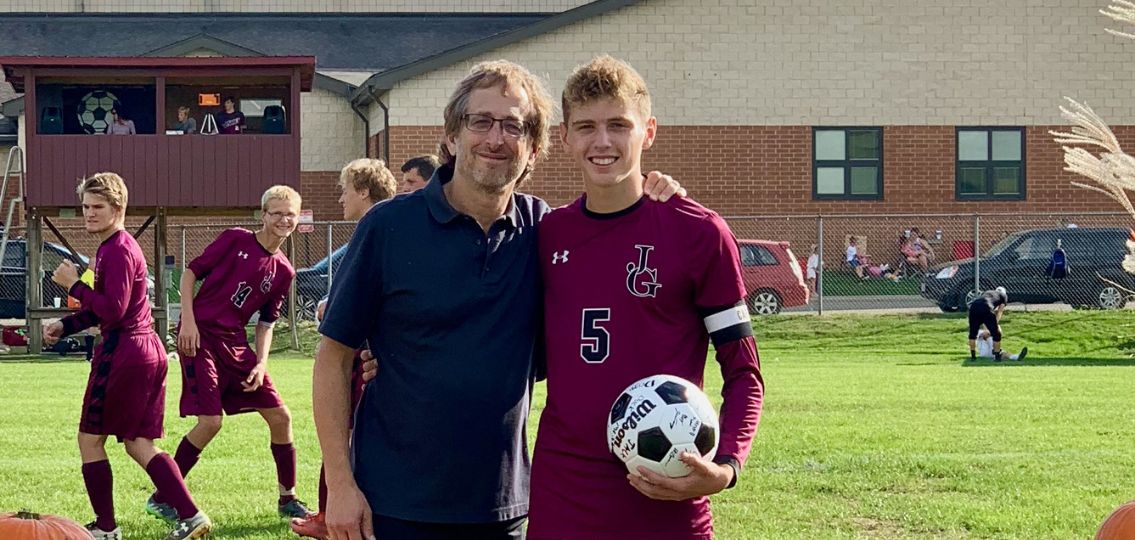
By Dr. Mark Shatz
What did you get for Father’s Day?
If you’re the dad of a young child, you probably got a shirt, hat, or cup declaring your status as “World’s Greatest Dad.” Older kids usually give activity-based Father’s Day gifts like, “Hey, let dad use his new chef’s apron and grill tools so he can cook for everyone.”
I’m a single dad raising a son, so I usually helped my child select my Father’s Day gifts, and then paid for them. When my son was a high school senior, he took control of the gifting by offering to drive us to Denny’s for breakfast.
The evening before the holiday, I couldn’t sleep.
At first, I thought my insomnia was due to the anticipation of building a Grand Slam. But what kept me awake was the realization that this would be the last Father’s Day before my kid left for college. I was preparing for empty nest life.
My fathering gig had progressed much too quickly. It truly felt like I had just taken the training wheels off my son’s bike. I went to the kitchen to have a hardy pity party. As I self-medicated my woes by raiding my son’s Pop-Tart collection, my refrigerator yelled, “Hey, look here!”
In my household, the fridge door is the all-knowing parental epicenter holding the academic and sports schedules, the school lunch menu, and the family calendar. Also plastered on it are photos, awards, artwork, and the “good” report cards. The refrigerator is a super-sized scrapbook of my son’s life.
The calendar and schedules consumed so much of my attention. Plus, all those rabbit holes of teenage life, such as sports, learning to drive, and college preparation, made me preoccupied with surviving my son’s adolescence. I never had the time to look carefully at the mementos of his childhood.
I began to examine the memorabilia by taking in the memories chronologically, which required me to pull the fridge out because all the infant and toddler stuff was shoved to the sides.
As I examined the golden oldies, I had three quick insights.
First, I clearly went overboard with the Shutterfly photo magnets. Second, I needed to dust the sides of the refrigerator. Third, soccer dominated our lives.
I never played or watched soccer before parenthood. Thus, my soccer IQ was in the single digits. Yet, I became the coach for all his teams until he reached middle school.
I didn’t coach because I loved the game; I coached because it seemed like a thing dads do. And when soccer became my son’s passion and he continued playing through high school, I still attended every scrimmage and game.
Back then I assumed it was my fatherly duty to support my son’s activities, but now I understood that I was wrong.
After years of supporting, guiding, and loving my son, I finally recognized that participating in my son’s life on any level was not an obligation—it was a privilege.
I time traveled through mementos, every reminiscence clarifying for me what it meant to be a dad. I recognized that the father-child relationship is like the Taoist symbol of Yin Yang. The two, the child and father, are part of a unified whole and an unbreakable permanent bond. That special, lasting connection is called fatherhood.
The realization triggered an avalanche of emotions. It overwhelmed me. I started crying, and I’m not sure why, because my predominant emotion was pride, not sadness.
And then it finally dawned on me.
Teenagers might not give us presents we want or need on Father’s Day. That’s okay. They have already given us the best possible gift—allowing us to feel what it’s like to be their dad.

 PARENTING TIPS
PARENTING TIPS PREGNANCY
PREGNANCY BABY CARE
BABY CARE TODDLERS
TODDLERS TEENS
TEENS HEALTH CARE
HEALTH CARE ACTIVITIES & CRAFTS
ACTIVITIES & CRAFTS

